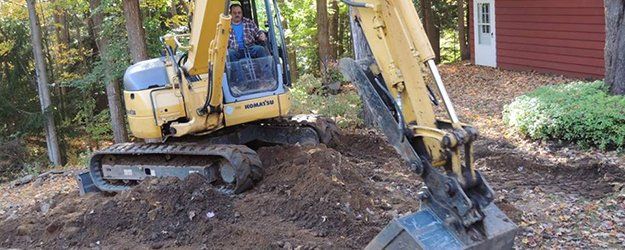Dump Truck Companies in Ohio - Trusted Dump Truck Solutions Throughout Ohio
Dump Truck Companies in Ohio - Trusted Dump Truck Solutions Throughout Ohio
Blog Article
Comprehensive Excavation Techniques: Understanding the Principles for Success
The mindful planning, accurate execution, and meticulous focus to detail called for in excavation projects require a comprehensive approach that encompasses different fundamental elements. The real proficiency exists not simply in comprehending these basics yet in perfectly integrating them to browse the intricacies of excavation projects with finesse.
Comprehending Excavation Project Preparation

The first phase of any excavation task is the preparation phase, where crucial decisions are made that can considerably influence the end result of the task. Recognizing the job scope, timeline, and budget plan restraints is important for creating an extensive excavation strategy that guarantees the project's success.
One trick aspect of excavation project preparation is the growth of a comprehensive timeline that describes the series of target dates, milestones, and tasks. By meticulously considering all these elements throughout the preparation stage, excavation tasks can be executed successfully and successfully, leading to effective results - excavating ohio.
Dirt Analysis and Site Evaluation
Performing comprehensive dirt evaluation and website assessment is a crucial action in the preparation phase of any excavation task. Dirt analysis involves establishing the make-up, framework, and homes of the dirt at the excavation website. This details is important for understanding the soil's bearing capacity, dampness content, and potential for disintegration, which are essential consider establishing the excavation techniques and equipment required for the task.
Website assessment surpasses dirt analysis and includes a wider analysis of the general site problems. This evaluation includes identifying any prospective hazards, such as below ground utilities, ecological worries, or unsteady terrain, that can affect the excavation procedure. By completely reviewing the site, task supervisors can establish efficient excavation methods that focus on safety, efficiency, and environmental management.
Utilizing innovative technologies like ground-penetrating radar, soil tasting, and drone studies can boost the accuracy and efficiency of dirt analysis and site evaluation. Spending time and resources in these preliminary steps can eventually save time and stop pricey delays or problems during the excavation procedure.
Equipment Selection and Utilization
Efficient excavation projects depend heavily on critical tools choice and application to make sure optimum efficiency and productivity. Picking the best equipment for the work is important in making the most of effectiveness and lessening downtime. Aspects such as the kind of dirt, deepness of excavation, and job range play a significant role in identifying the most suitable equipment for the job handy.

In addition to selecting the suitable devices, appropriate utilization is crucial to task success. Operators has to be educated to deal with the tools securely and efficiently - dump truck companies in ohio. Normal upkeep checks and prompt fixings help protect against break downs and guarantee regular efficiency throughout the task
Safety Steps and Rules Compliance
In the world of excavation jobs, prioritizing precaution and compliance with regulations is critical to guaranteeing a secure and legitimately sound functional setting. Safety procedures incorporate a range of practices, including conducting comprehensive website evaluations, applying appropriate signage and obstacles, and supplying adequate safety and security training for all personnel entailed in the More Help excavation procedure. Adherence to regulations, such as OSHA demands in the United States, ensures that the excavation project fulfills the necessary requirements to protect workers, bystanders, and the surrounding setting.

Tracking Development and Adjusting Approaches
Just how can forecast managers efficiently track the advancement of excavation jobs and adapt their approaches as necessary click over here now to maximize end results? Surveillance progression is crucial for making certain that excavation tasks remain on track and fulfill due dates. Project supervisors can use numerous tools and methods to track progression, such as daily report card, normal website examinations, and advanced monitoring technologies like drones and general practitioners tracking systems. By constantly keeping an eye on the project's development, managers can identify any potential hold-ups or issues early and take positive measures to address them.

Conclusion
In final thought, mastering the principles of extensive excavation approaches is vital for the success of any task. By understanding job planning, analyzing dirt and site problems, choosing ideal tools, abiding with safety regulations, and monitoring progress, task supervisors can make sure a smooth and reliable excavation procedure. Applying these strategies will result in effective outcomes and reduce prospective threats or setbacks throughout the excavation job.
The preliminary phase of any type of excavation task is the preparation phase, where crucial decisions are made that can significantly influence the result of the task. Understanding the job timeline, budget, and extent restraints is critical for developing a thorough excavation strategy that guarantees the task's success.
How can predict supervisors efficiently track the advancement of excavation jobs and adjust their approaches accordingly to enhance end results? By very closely keeping an eye on development and being willing to adapt methods, task supervisors can enhance the general success of excavation projects.
By understanding task planning, evaluating soil and site conditions, selecting ideal equipment, conforming with safety and security regulations, and monitoring progress, task supervisors can make certain a efficient and smooth excavation procedure.
Report this page